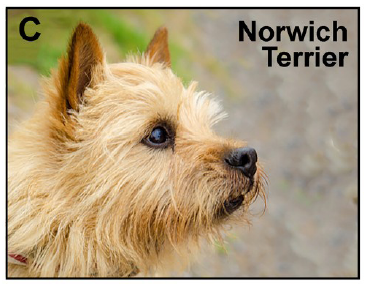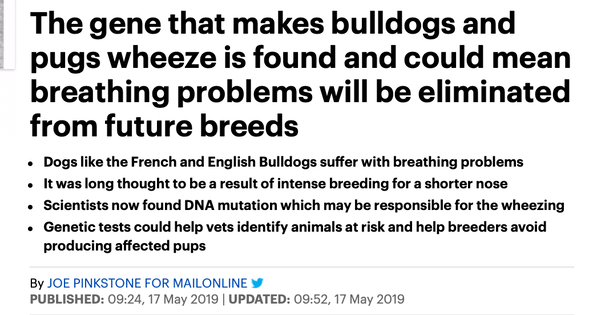| No, we have NOT found the mutation that causes breathing problems in brachycephalic dogs. |
A paper has just been published that is being grossly misinterpreted by the press, and even by the Institute where the study was done (Marchant et al. 2019). This is the title of the study:
These are the critical points of the study:
A) Norwich Terrier
- This is a study about breathing problems in the Norwich Terrier.
- The study found a gene that causes swelling of the airway tissues of Norwich Terriers, which iinterferes with breathing.
- The Norwich Terrier is not a brachycephalic breed.
B) Other breeds
- They also found the mutation in most Bulldogs.
- They found the mutation in only a few French Bulldogs.
- They did not find the mutation in Pugs.
- The Norwich Terrier is not brachycephalic, so the effect of this mutation is not linked to brachycephaly.
- Most French Bulldogs do NOT have the mutation.
- The mutation is absent in Pugs.
- Therefore, this gene is NOT the main cause of breathing problems in Bulldogs, Frenchies, and Pugs..
"Dog DNA find could aid breathing problems
Scientists have discovered a DNA mutation linked to breathing problems in popular dog breeds.
Breathing difficulties are most often associated with flat-faced breeds, such as French bull dogs and pugs, but scientists have found the mutation is also carried by Norwich terriers, which have proportional noses.
The finding could inform future genetic tests that could help vets identify animals at risk, and help breeders avoid producing affected pups."
Read the points above. This study did not find a mutation that causes breathing problems in brachycephalic breeds. Only a few Frenchies had the mutation, and it is completely absent in Pugs. The mutation was found in Norwich Terriers, where it has NOTHING to do with brachycephaly because the Norwich Terrier is not brachycephalic.
This article is also wildly incorrect. The gene was not found in Pugs. So no, this is not the gene that makes Pugs wheeze. The gene does occur in Bulldogs, but this study did not examine whether it is a cause of breathing problems in this breed, for which there is much evidence that the brachycephalic head shape is a major risk factor for breathing issues. This piece doesn't even mention the Norwich Terrier. In fact, this headline should have said something like "Mutation that causes breathing problems in Norwich Terriers is not the cause of problems in brachycephalic breeds."
No, we have NOT found the mutation that causes breathing problems in brachycephalic dogs.
Marchant et al. 2019. An ADAMTS3 missense variant is associated with Norwich Terrier upper airway syndrome.
PLoS Genetics 15: e1008102. https://doi.org/10.1371/journal.pgen.1008102
ICB's online courses
***************************************
Visit our Facebook Groups
ICB Institute of Canine Biology
...the latest canine news and research
ICB Breeding for the Future
...the science of animal breeding




